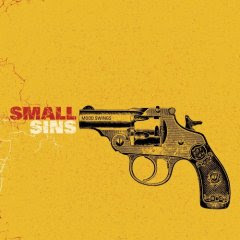
by Miné Salkin | May 16, 2008 | albums
Eye Contact
E.S.L

E.S.L’s debut album Eye Contact is a fantastical, muscial-theatrical type hybrid that seems to bridge together the innocence of black and white films with modern day anxieties.
The album opens with a rhythmically-driven track which is backed up by earthy cellos chanting in a catchy gusto melody. Following this sound, the album takes a more soulful, heartfelt turn at “Side by Side” where singer Marta Jacubek-McKeever’s vocal ache resonates alongside the melancholic violin arrangement. However, this album possesses more than just a simple juxtaposition between innocence and heartache, as it ventures into musical dramas and swing melodies. Duffy Driediger of Ladyhawk samples his lyrical talent in “Like a Hurricane,” giving the album a sweet touch of masculinity amongst a plethora of lush strings. Marta indulges her Polish ancestry with “Czarne Oczy,” creating a campy, foreign-like sound that makes you want to dance around a campfire and howl at the moon. Still not random enough? The quartet completes the album with all-girl cover of Beastie Boy’s classic song “Girls.” This fact alone should inspire immediate respect for the Vancouver group.
Retrospectively, Eye Contact seems like the kind of albumv that would have existed if transcendental musicians Bjork and Elsiane combined with the 90’s swing band the Squirrel Nut Zippers would have sounded like, but in a black and white film from the 30’s.
by Miné Salkin | Mar 24, 2008 | albums
Proof of Love
Old Man Luedecke
Black Hen Music
A follow-up from the critically acclaimed album Hinterland, Old Man Luedecke’s new album captures the ad lib words and feelings of the tender hearted. Recorded in two days flat, Old Man sums up the spirit of the ages and the search for a proof of love in under three minutes each.
Beautifully simple and stripped down, the album glosses over the beauty of the world, nature, and under it all is the theme of individual self-determination. Lyrics such as “I’ve been to the bottom of fear and self-loathing/but this is my home” show both the problems of introspection and the brimming optimism that things invariably get better. “Send my Troubles Away” is a song that bridges the gap between rural life and death by urban streets, complimented by soft female backup singers who have that delicate sing-song quality that makes you want to stretch out on the grass on a warm summer afternoon. Songs like “Sad as a Forest” and “Johnny Has Gone for a Soldier” have the same poetical integrity asIron and Wine, but with the banjo twang adds sharp pep to their otherwise mellow sound. It’s definitely the childlike honesty and simplicity that makes Proof of Love the quintessential, ‘cheery’ kind of album you’d need on these rainy Vancouver days.

by Miné Salkin | Mar 24, 2008 | albums

my new favourite band
Plunder, Beg and Curse
Colour Revolt
Fat Possum Records
Plunder, Beg and Curse is fantastic. Based out of Mississippi, the quintet’s new album rocks out softly and sadly with a satirical, seven deadly sins theme, complete with messy, blemished illustrations on the jacket cover.
The opening track sounds eerily like early Yeah Yeah Yeahs, but then gets way more hypnotic. Singer Jimmy Cajoleas croons “I’m still swinging from the liquor tree” imitating God’s image, the fall of man, and the garden of Eden which is later described as “a hell of a place.”
The album peaks at “Ageless Everytime,” a pained song about rejection and unrequited love, not to mention the absurdity of carnal, animal attraction. Utlimately depressing, this track is like an ugly version ofKevin Drew’s prettyboy music, but the gritty aesthetic is completely satisfying on a different level.
Altogether abysmal and dreary, Plunder Beg and Curse is a cycle of sin and redemption that we can’t help but fall into over and over again. The album as a whole seems to feel like 2005 new music sampler, caught somewhere between alternative rock and indie-pop, and with surprisingly insightful lyrical sensitivity. Colour Revolt sounds much like Franz Ferdinand imitating Death Cab, but with a holier-than thou, pretentious, never-ending quality that emphasizes the fall from grace and man’s descent into a world of pain.

by Miné Salkin | Feb 22, 2008 | albums
Country Houses, City Street
The Pickups
Beautifully Misguided Records
Finally! A band so incredibly emo, but not a single pretentious member with that awful, downward bent head gesture and shaggy hair covering one eye. Described as “flaneur-pop,” The Pickups are lovely in a minimalist, micro-pop, fuzzy soft drink sort of way. Touching on ideas like random childhood memories, first loves, and nostalgic neighborhoods, songs such as “Augusta” and “Country Houses” truly capture those fleeting memories that bring up the sentimentality of youthful idealism.
 The track “Compromise” immediately brings to mind a casual walk in a park, or a moment of unbridled honesty – the modest sound of Country Houses, City Streets seems to invoke a feeling of unguarded lightheartedness. In particular, “Country Houses” brings the whole introspective sentimentality to the forefront, not unlike a marriage between Belle and Sebastian and Apples in Stereo, discussing notions of lost loves and regret.
The track “Compromise” immediately brings to mind a casual walk in a park, or a moment of unbridled honesty – the modest sound of Country Houses, City Streets seems to invoke a feeling of unguarded lightheartedness. In particular, “Country Houses” brings the whole introspective sentimentality to the forefront, not unlike a marriage between Belle and Sebastian and Apples in Stereo, discussing notions of lost loves and regret.
The lyrical component to The Pickups adds to their appeal tremendously. Lines such as “There are those hard to love hard to leave/ and the people I love keep on loving me back” spur this overwhelming sympathy and universal understanding that living in a city isn’t easy.
Ultimately, The Pickups illustrate the most common human interactions, but in a modest, poetically minimalist way; it’s their honesty and non-reactionary apathy that will make its way into your heart.

by Miné Salkin | Feb 21, 2008 | albums
 East of West
East of West
House of Doc
Pacific Music
Hailing from Winnipeg, House of Doc’s third album East of West celebrates love, life, and Canadian sensibilities in a light, amusing way.
Upbeat, folksy, and altogether jovial, this album provokes the lighter side of everything mundane and shifts the emphasis to family life, escaping the plight of urban noise and reverting to a frugal, simple sound. This is furthered by the altogether familial relation between the members – the group is made up of Matthew Harder, his wife Rebecca and her brother Dan Wiebe. At the first listen, one cannot help but draw parallels to the score of “O Brother, Where Art Thou?” but a version more preoccupied by the Canadian landscape.
Tracks such as “Summerstone” and “Milk and Cookies” are brimming with an optimism that can only be fully backed up by harmonicas and banjos. However, the album as a whole is more profound; in particular, “Simple Times” is a song recorded by one single and immaculate take. Flanked by stripped down, harmonic tunes, East of West has that honest, human quality about it that is only truly appreciated by the humble.
Rebecca Harder croons hypnotically in “Lullaby,” giving it a soulful and melodic contrast to some of their more upbeat, bluegrass tracks. Also, the final track brings the album full circle with a secret song – when was the last time anybody did that?

by Miné Salkin | Nov 18, 2007 | albums
mood swings
small sins
boompa records

The Small Sins recently released their second album,
Mood Swings as a follow-up from their debut eponymous work from 2006. Based out of Toronto, the quintet rocks out with groovy, contemplative electro-typical songs not unlike a marriage between Death Cab and Grandaddy. In fact, several tracks such as “I Need a Friend” and “On the Run” sound something fresh off a Postally-Serviced musical venture into popular synth mash-ups. This whole album seems to capture that trend, blending together the unlikely wishy-washy complaints of unrequited love and catchy, upbeat synth-pop. In fact, Mood Swings seems to unravel the cool veneer of the aloof, dance-mystique, with lyrics such as “I’m thirsty like a diabetic,” showing that altogether draining feeling of ineptitude and personal emotional incompetence. At the same time though, the lyrical component is certainly lacking in Mood Swings – peaking at “On a Mission,” the tunes deliver that plurality of emotions in being feeling utterly rejected, but the lyrics don’t back it up at with the same integrity. On the whole, this album moves in one direction only – a euphonic but mindless expression of the broken hearted. But maybe that’s the point; love reduces the rejected into a droning, monotonous verbal plane. Indeed, just like how frontman Thomas D’arcy lethargically relates, “we’re all tired all the time.”





